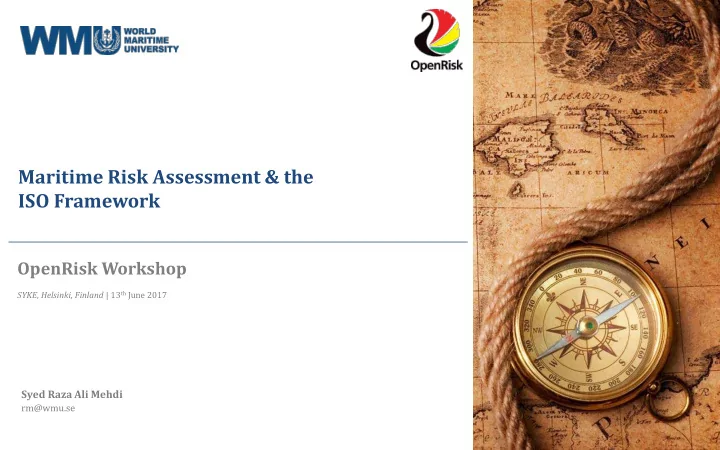

Maritime Risk Assessment & the ISO Framework OpenRisk Workshop SYKE, Helsinki, Finland | 13 th June 2017 Syed Raza Ali Mehdi rm@wmu.se
Icebreaker Maritime Risk Assessment & the ISO Framework | 2
Icebreaker o Background: • MSc. Engineering Dynamics & Control • BEng. Aerospace Engineering • Flight Test Certifications o Current Status: • MaRiSa Research Group @ WMU Research Assistant 3 rd Year PhD Student • Technical Officer OpenRisk Project o Research Areas: • Risk, Safety & Reliability Assessments • Risk-Based Marine Spatial Planning • Accident Investigation Maritime Risk Assessment & the ISO Framework | 3
Research Work Maritime Risk Assessment & the ISO Framework | 4
Dynamic vs Static Risk Assessment o Static risk assessment: o Dynamic risk assessment: • Non-operational • Operational Does not focus on one operation, but covers Generally focuses on one single operation many ship movements in an area Focuses on a specific time period during the operational phase of a system Focuses on a wide time period • Reactive – usually conducted during an on- • Proactive – generally conducted during the planning phase going operation • More deterministic than probabilistic • Probabilistic Either the consequences of an event are known • More ‘controllable’ parameters that can be and/or the probability of the event is 1 or 0 changed • Less ‘controllable’ parameters • Low certainty about information The few ‘controllable’ operational parameters • High availability of time & resources (e.g. ship speed, rudder angle) may be used to • Outcomes directly effect dynamic risk quantify the risk in a scenario assessment conducted during an operation • High level of certainty • Low availability of time & resources Maritime Risk Assessment & the ISO Framework | 5
Static Risk Assessment o Sophisticated NRA frameworks/models already exist (Mehdi & Schröder-Hinrichs 2016) • Significant literature on contact, collision, grounding models • E.g. of previous work includes NRA models for bridges, quays, oil platforms Maritime Risk Assessment & the ISO Framework | 6
Static Risk Assessment o Consequence model selection was partially based on literature review & surveys • Included a comprehensive review of 50+ contemporary damage assessment models • Presented at Intl. Conference on Ships & Offshore Structures (ICSOS) 2016 Maritime Risk Assessment & the ISO Framework | 7
Static Risk Assessment Maritime Risk Assessment & the ISO Framework | 8
Dynamic Risk Assessment o Why: lack of communication between operational & non- operational maritime users • Survey of 122 seafarers shows 104 are unaware of any NRA studies around OREIs • Results of a typical NRA often ‘meaningless’ for seafarers Exception: if a risk-control option is integrated as a result of the NRA that influences maritime operations o What: dynamic risk model that can be integrated as a decision support system • Based on ship manoeuvrability & hydrodynamics Relates the probability of an accident to the safe manoeuvring area available to a ship • Initially developed for maritime collision avoidance • Developed from the principles for ACAS/TCAS used in the aviation industry Maritime Risk Assessment & the ISO Framework | 9
Dynamic Risk Assessment Maritime Risk Assessment & the ISO Framework | 10
Dynamic Risk Decision Support System: Future Work o Several potential future developments: • Incorporate drift envelope calculations • Integration with AIS data (variant already been demonstrated successfully by Nakano & Hasagawa in 2012) • Potential integration of consequence assessment based on ship speed & rudder angle at time of collision, contact or grounding • Integration with KPIs? Maritime Risk Assessment & the ISO Framework | 11
Improving Input Data for Risk Assessment Processes o MaRiSa Simulator Lab: • DNV-GL certified, multiple simulators: Desktop ship handling – Basic navigational equipment as specified by SOLAS – Internal Communication – e.g. – engine room to bridge – External Communication – e.g. – VTS Safety & Security Training – Virtual-reality – Simulates on-board accidents HECSALV – Damage Stability simulator Manoeuvring station – Predictive ship manoeuvres Engine room simulator • SenseFloor to track movement on bridge Maritime Risk Assessment & the ISO Framework | 12
Improving Input Data for Risk Assessment Processes Maritime Risk Assessment & the ISO Framework | 13
In the Context of ISO 31000 & 31010 Maritime Risk Assessment & the ISO Framework | 14
Risk Assessment/Management Maritime Risk Assessment & the ISO Framework | 15
Tips from ISO 31000/31010 Maritime Risk Assessment & the ISO Framework | 16
Thank You!
Recommend
More recommend